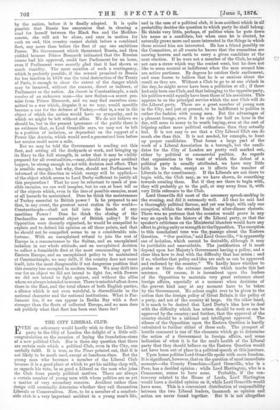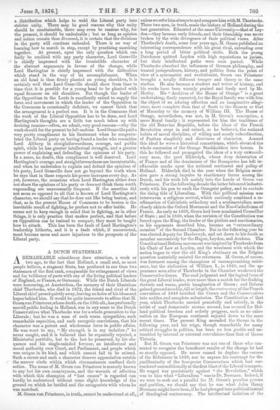THE CITY LIBERAL CLUB.
and in the ease of a political club, it is an accident which in all probability decides the question to which party he shall belong_ He thinks very little, perhaps, of politics when he puts down his name as a candidate, but when once he is elected, he naturally grows more and more interested in the things in which those around him are interested. He has a friend possibly on the Committee, at all events he knows that the committee are- moving heaven and earth to carry a given candidate at the next election. If he were not a member of the Club, he might not care a straw which way the contest went, but he does not like to seem neutral or indifferent when the men around him, are active partisans. By degrees he catches their excitement, and soon learns to believe that he is as anxious about the result as they are. Without a Club to go to at one o'clock in the day, he might never have been a politician at all ; if there had only been one Club, and that belonging to the opposite party, his politics would equally have been those of his associates. This- appears to us the principal service which the new Club will do- the Liberal party. There are a great number of young men in the City, and just at present, to be indifferent to politics is. rather the fashion with young raen. But the advantages of a pleasant lounge, even if it be only for half an hour in the day, will seem to many to be worth buying, even at the cost of feigning rather more political enthusiasm than they actually feel. It is not easy to see that a City Liberal Club can do. much else than this. It is not needed, for e±aruple, to hunt up proper candidates. That forms a large part of the work of a Liberal Association in a borough, but the candi- dates for the City of London are pretty well marked out,. either by political or commercial position. As regards that organisation to the want of which the defeat of a political party is usually attributed, we have very little. faith in its value, except as it affects the number of Liberals in the constituency. If the Liberals are not there to begin with, the Club may, as we have shown, do something towards creating them. But if they are there to begin with, they will probably go to the poll, or stay away from it, with very little reference to the Club.
Lord Granville did most of the necessary speech-making in the evening, and did it extremely well. All that he said had a thoroughly political flavour, and yet was kept, with only one exception, within the straitest limits of after-dinner rhetoric. There was no pretence that the occasion would prove in any way an epoch in the history of the Liberal party, or that the' speaker's criticisms on the Ministerial blunders would have any effect in giving-unity or strengthto the Opposition. The exception to this nonchalant tone was the passage about the Eastern Question. "Our position," said Lord Granville, "is apparently one of isolation, which cannot be desirable-, although it may- be justifiable and unavoidable. The justification of it must depend upon her Majesty's Government having a policy, and a. clear idea how to deal with the difficulty that has arisen ; and if so, whether that policy and idea are such as can be approved and endorsed by the country." We hardly know whether to, praise or blame the extreme caution which marks this last sentence. Of course, it is incumbent upon the leaders of the Opposition to maintain very great reticence about foreign affairs, especially at a moment when decisions of the gravest kind may at any moment have to be taken by the Government. No colour ought ever to be given to the notion that the foreign policy of Great Britain is the policy of a party, and not of the country at large. On the other hand, it is much to be desired that Lord Derby's idea how to deal with the difficulty which has arisen should be such as can be approved by the country; and further, that the approval of the country should be a rational and intelligent approval. The- silence of the Opposition upon the Eastern Question is hardly calculated to further either of these ends. The prospect of hostile comment is one of the elements which go to determine, the action of a Government in foreign affairs, and some- indication of what it is for the sours health of the Liberal- party that they should believe on the Eastern Question would not have been out of place in a political speech at this juncture.
Upon home politics Lord Granville spoke with more freedom. It is significant, however, that on the question of most immediate moment—the County Franchise—Lord Granville, who is a Peer, has a decided opinion ; while Lord Harlington, who is a Commoner, seems to have none. Probably, if the con- troversy related to the House of Lords, Lord Harlington would have a decided opinion on it, while Lord Granville would have none. This is a convenient distribution of responsibility between the two Liberal leaders, inasmuch as opinion and action are never found together. But it is not altogether
a distribution which helps to weld the Liberal party into stricter unity. There may be good reasons why this unity should be unattainable, there may even be reasons why, for the present, it should be undesirable ; but as long as opinion and action remain thus divorced, it is certain that the divisions in the party will continue unhealed. There is no way of learning how to march in step, except by practising marching together. At present, upon the only question which can fairly be credited with any party character, Lord Granville is chiefly impressed with the irresistible character of the abstract arguments in favour of the change, while Lord Hartington is chiefly impressed with the difficulties which stand in the way of its accomplishment. When an old head is thus firmly planted on young shoulders, it is certainly well that Lord Granville should show from time to time that it is possible for a young head to be planted with equal firmness on old shoulders. But though the leader of the Opposition in the Lords is excellently suited to supply the force and movement in which the leader of the Opposition in the Commons is occasionally deficient, we cannot think that the arrangement is a perfect one. It is in the Commons that the work of the Liberal Opposition has to be done, and Lord Hartington's thoughts are a little too much taken up with devising reasons—often, we admit, very good reasons—why the work should for the present be left undone. Lord Granville paid a very pretty compliment to his lieutenant when he congratu- lated the Liberal party on having found a leader who resembles Lord Althorp in straightforwardness, courage, and public spirit, while he has greater intellectual strength, and a greater power of explaining and defending the opinions of his party. In a sense, no doubt, this compliment is well deserved. Lord Hartington's courage and straightforwardness are incontestable, and when he undertakes to explain and defend the opinions of his party, Lord Granville does not go beyond the truth when he says that in these respects his power increases every day. As yet, however, the occasions when Lord Hartington either does not share the opinions of his party or does not think them worth expounding are unnecessarily frequent. If the assertion did not seem so opposed to all that is known of Lord Hartington's character, we should say that he does not like being beaten, and that, as in the present House of Commons to be beaten is the inevitable result of fighting, he prefers not to offer battle. He seems not to keep enough in mind that in fighting, as in other things, it is only practice that quakes perfect, and that before an Opposition can be trained to conquer, they must be taught how to attack. This has been the fault of Lord Hartington's leadership hitherto, and it is a fault which, if uncorrected, must become more and more injurious to the prospects of the Liberal party.































 Previous page
Previous page